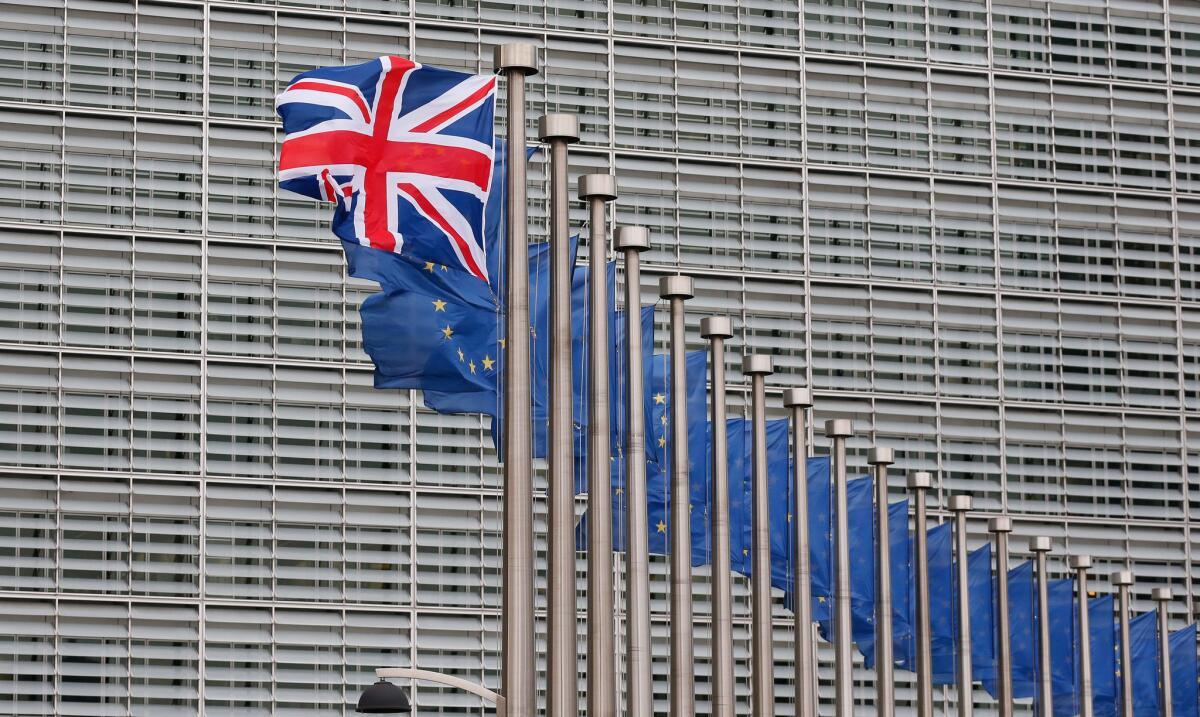Will Britain leave the European Union?

The British Union Jack flutters next to European Union flags at the European Commission in Brussels, Belgium.
- Share via
Reporting from London — As Britain debates whether to leave the European Union, leaders across the continent are trying to avoid a potentially devastating split.
The country has long had an uneasy relationship with the rest of the 28-member bloc, having used its status as an economic powerhouse to keep its currency — the pound sterling — while all other members except Denmark now uses the euro or are shifting to it.
Proponents of a departure argue that Britain would save billions in membership fees, regain full control of its borders and free small- and medium-sized businesses from restrictive EU laws.
NEWSLETTER: Get the day’s top headlines from Times Editor Davan Maharaj >>
They have been gaining political power, to the point that in 2013 Prime Minister David Cameron pledged that if he won another term in office he would hold a referendum asking whether the country should remain in the EU.
The promise was an attempt to win over the more hard-line, “Euroskeptic” elements of his Conservative Party at a time when the UK Independence Party was gaining ground and campaigning on a staunchly anti-EU platform.
The referendum could be held as early as this summer.
Cameron wants Britain to remain part of the union, as long as key reforms can be made. To that end, he has been negotiating for months with the EU to reshape Britain’s role. On Tuesday, the president of the European Council, Donald Tusk, presented a draft text of a deal.
Among its most controversial provisions is one that would allow Britain to withhold in-work benefits from EU migrants who have been there for less than four years.
It also states that Britain is “not committed to further political integration into the European Union.”
Any deal would have to be approved by all EU nations, which could happen as soon as Feb. 18 at a summit in Brussels.
With a sense that a clock is ticking down, the union is feeling growing unease that a crucial member could exit and that the consequences could be dire.
“Brexit” — as a British departure has been dubbed — would damage the union’s economic and political power and potentially lead other countries to reassess their own membership. In France, Marie Le Pen, leader of the far-right National Front Party, has already announced plans for a similar referendum if she wins her country’s 2017 elections.
The immediate issue facing European leaders is how to offer Britain enough concessions to avoid a breakup without seriously undermining the union.
Germany, the largest member of the EU, is a key leader of the effort to keep the union intact. But the current proposal is already being challenged by members in Eastern Europe.
Poland has been especially vocal in its opposition of any deal that would restrict benefits for migrants. Cameron is scheduled to travel there on Friday to try to secure its support.
Konrad Szymanski, Poland’s Europe minister, recently summarized the dilemma: “We can’t accept discrimination but then how does Cameron offer something for people who are against migration?”
In his letter to members of the European Council, Tusk described the process to date as “difficult” and said there are still “challenging negotiations ahead.”
“Nothing is agreed until everything is agreed,” he wrote.
Cameron has said the draft deal offers “substantial change.”
Join the conversation on Facebook >>
He said he has negotiated to ensure that Britain is not disadvantaged because it does not use the euro, and to give national parliaments the ability to block EU legislation. He also wants the EU to trim bureaucracy that his government says is damaging to UK businesses.
“I’m not arguing, and I will never argue, that Britain couldn’t survive outside the EU,” Cameron said Wednesday in the House of Commons.
“The question is not could Britain succeed outside the European Union, it is how will we be most successful … how will we have the most influence on the rules that shape the global economy and affect us.”
“The best answer to those questions,” he said, “can be found within a reformed European Union.”
Debate over Britain’s future in the EU has been heating up in anticipation of the Brussels summit and the referendum.
Nigel Farage, leader of the UK Independence Party, called the draft deal “really rather pathetic.” Those in the exit camp have begun to amp up their rhetoric, but the campaign still lacks a big hitter who can galvanize public support.
There were signs that London Mayor Boris Johnson would be their man, but so far he has declined to chose sides, saying he wants to see the final agreement first.
Within the ranks of Cameron’s government, Cabinet members have also remained tight lipped about their views on the deal on the table or how they intend to vote. They too are not expected to make their opinions known until a deal is reached.
The referendum looks likely to take place in June, but the timing has not been set. The first ministers of Scotland, Wales and Northern Ireland wrote a letter to Cameron saying that the referendum will “distract” them from devolved elections taking place in their respective countries in May.
At least one issue appears to have been settled. After much debate, all sides finally agreed on the wording of the referendum: “Should the United Kingdom remain a member of the European Union or leave the European Union?”
Boyle is a special correspondent.
ALSO
British law expands definition of domestic abuse to include psychological harm
Global health agency’s declaration signals new phase in battle against Zika virus
British explorer Henry Worsley dies after getting within 30 miles of finishing solo Antarctic trek
More to Read
Sign up for Essential California
The most important California stories and recommendations in your inbox every morning.
You may occasionally receive promotional content from the Los Angeles Times.










